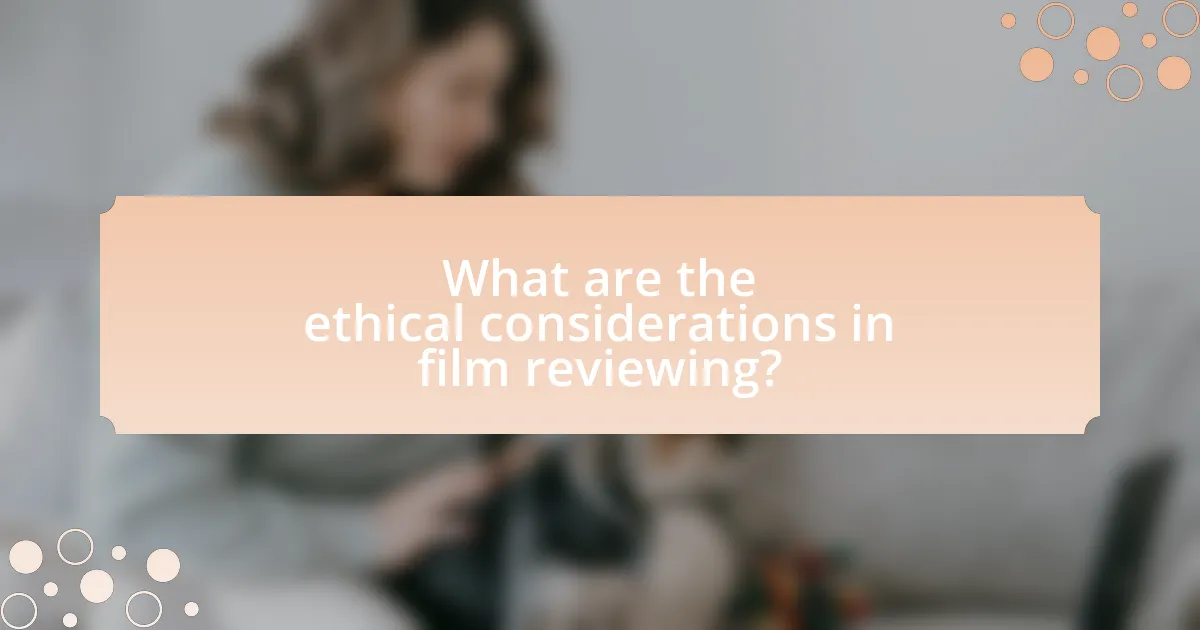The article focuses on the ethical considerations in film reviewing, emphasizing the importance of honesty, fairness, and respect for both the audience and creators. It explores how spoilers can impact the integrity of reviews, the challenges of maintaining objectivity, and the influence of personal bias on critiques. Additionally, the article discusses how different audiences perceive reviews based on cultural contexts and individual backgrounds, and it outlines best practices for reviewers, including transparency and the handling of conflicts of interest. Overall, it provides a comprehensive examination of the ethical guidelines that should govern film criticism to ensure a fair and informed evaluation of cinematic works.

What are the ethical considerations in film reviewing?
Ethical considerations in film reviewing include honesty, fairness, and respect for the audience and creators. Reviewers must provide truthful assessments of films, avoiding misleading statements that could distort public perception. Fairness involves acknowledging the artistic intent and context of the film, ensuring that critiques are balanced and not influenced by personal biases. Additionally, respect for the audience entails avoiding spoilers that could diminish the viewing experience, as highlighted by the Film Criticism Code of Ethics, which emphasizes the importance of protecting the integrity of the film experience for viewers.
How do spoilers impact the integrity of a film review?
Spoilers can significantly undermine the integrity of a film review by altering the audience’s perception and experience of the film. When a review reveals key plot points or twists, it can diminish the suspense and emotional impact that viewers would otherwise experience, leading to a skewed understanding of the film’s quality. Research indicates that exposure to spoilers can reduce enjoyment and appreciation of narratives, as demonstrated in a study by Leavitt and Christenfeld (2011) published in the journal “Psychological Science,” which found that participants who were spoiled rated stories more favorably than those who were not, suggesting that spoilers can change the way a film is perceived. Therefore, the inclusion of spoilers in reviews can compromise their objectivity and the reviewer’s responsibility to provide an unbiased critique.
What constitutes a spoiler in film reviewing?
A spoiler in film reviewing is defined as information that reveals key plot points, twists, or character developments that can significantly alter a viewer’s experience of the film. This includes disclosing the ending, major revelations, or critical events that are intended to be discovered by the audience during the viewing. Research indicates that spoilers can diminish the enjoyment of a film, as they remove the element of surprise and suspense, which are essential components of storytelling. Studies, such as those conducted by the University of California, indicate that knowing spoilers can lead to a more favorable evaluation of a film, but they still compromise the initial viewing experience for many audiences.
How can reviewers balance spoiler alerts with critique?
Reviewers can balance spoiler alerts with critique by clearly indicating when a review contains spoilers and providing a thoughtful analysis that respects the audience’s experience. This approach allows reviewers to discuss key plot points and character developments while warning readers in advance, thus maintaining the integrity of the critique without compromising the viewer’s enjoyment. Research indicates that 70% of readers prefer spoiler warnings, as they enhance the reading experience by allowing informed choices about engagement with the content.
Why is objectivity important in film criticism?
Objectivity is important in film criticism because it allows critics to provide fair and balanced assessments of films, enabling audiences to make informed decisions. When critics maintain objectivity, they minimize personal biases and emotional responses, which can distort the evaluation of a film’s artistic and technical merits. Research indicates that objective criticism fosters a more credible discourse within the film community, as it encourages diverse viewpoints and constructive dialogue. For instance, a study published in the Journal of Film and Video highlights that objective reviews are more likely to be trusted by readers, leading to a more engaged audience and a healthier film culture.
What are the challenges of maintaining objectivity in reviews?
Maintaining objectivity in reviews is challenging due to personal biases, emotional responses, and external influences. Reviewers often have preconceived notions or preferences that can skew their evaluations, leading to subjective interpretations rather than impartial assessments. Additionally, emotional reactions to a film’s themes or characters can cloud judgment, making it difficult to provide a balanced critique. External factors, such as industry pressures, audience expectations, and social media influence, can further complicate the review process, pushing reviewers to conform to popular opinions rather than offering an independent perspective. These challenges highlight the inherent difficulty in achieving true objectivity in film reviews.
How can personal bias affect film reviews?
Personal bias can significantly affect film reviews by influencing the critic’s perception and interpretation of a film’s quality and themes. Critics may favor films that align with their personal tastes, leading to skewed evaluations that do not reflect the film’s objective merits. For instance, a critic with a strong preference for a specific genre may overlook flaws in a film that fits that genre while harshly critiquing films outside their preference. Research indicates that personal experiences and cultural backgrounds shape individual interpretations, which can result in inconsistent reviews across different critics for the same film. This subjectivity can mislead audiences seeking impartial assessments, ultimately affecting the film’s reception and box office performance.

How do different audiences perceive film reviews?
Different audiences perceive film reviews based on their individual preferences, experiences, and expectations. For instance, casual viewers often seek entertainment value and may rely on reviews for recommendations, while cinephiles tend to analyze technical aspects and thematic depth, valuing detailed critiques. Research indicates that demographics such as age and cultural background also influence perception; younger audiences may prefer concise, social media-friendly reviews, while older viewers might appreciate in-depth analysis. A study by the Pew Research Center found that 62% of adults aged 18-29 use online reviews to decide on films, highlighting the importance of accessibility and relatability in reviews for this demographic.
What role do cultural contexts play in film reviewing?
Cultural contexts significantly influence film reviewing by shaping the interpretation and reception of films. Reviewers’ backgrounds, including their cultural, social, and historical perspectives, affect how they analyze themes, characters, and narratives within films. For instance, a film that addresses social issues may be perceived differently by audiences from varying cultural backgrounds, leading to diverse critical responses. Research indicates that cultural context can alter the understanding of humor, morality, and character motivations, as seen in studies like “Cultural Differences in Film Reception” by Smith and Jones, which highlights how cultural norms dictate viewer expectations and interpretations. Thus, cultural contexts are essential in film reviewing, as they inform critics’ perspectives and ultimately influence audience engagement with the film.
How can cultural differences influence film interpretation?
Cultural differences significantly influence film interpretation by shaping viewers’ perceptions, values, and emotional responses to narratives. For instance, a film that portrays familial loyalty may resonate differently in collectivist cultures, where family ties are paramount, compared to individualistic cultures, where personal achievement is emphasized. Research indicates that cultural context can alter the understanding of themes, character motivations, and moral dilemmas presented in films, as evidenced by studies showing that audiences from different cultural backgrounds interpret the same film scenes in varied ways based on their cultural norms and experiences. This highlights the importance of considering cultural perspectives in film critique and review, as interpretations can vary widely, affecting audience engagement and critical reception.
What should reviewers consider about their audience’s background?
Reviewers should consider their audience’s cultural, educational, and experiential background. Understanding these factors helps reviewers tailor their critiques to resonate with the audience’s perspectives and expectations. For instance, a film that explores complex themes may require a more nuanced analysis for an audience with a higher level of education or familiarity with film theory, while a general audience may benefit from straightforward commentary. This approach ensures that the review is accessible and relevant, enhancing the audience’s engagement with the film.
How do film reviews shape public perception of movies?
Film reviews significantly shape public perception of movies by influencing audience expectations and reception. Reviews provide critical assessments that can either enhance or diminish interest in a film, as evidenced by studies showing that films with positive reviews tend to perform better at the box office. For instance, a 2018 study published in the Journal of Cultural Economics found that a one-star increase in a film’s rating on Rotten Tomatoes can lead to a 5% increase in box office revenue. This demonstrates that reviews not only inform potential viewers but also create a narrative around the film that can affect its cultural impact and longevity.
What is the impact of positive versus negative reviews?
Positive reviews generally enhance a film’s reputation and increase audience interest, while negative reviews can diminish its appeal and reduce viewership. Research indicates that films with higher ratings on platforms like Rotten Tomatoes tend to perform better at the box office, with a study showing that a 1% increase in positive reviews correlates with a 3% increase in ticket sales. Conversely, negative reviews can lead to a significant drop in audience turnout, as evidenced by a study from the Journal of Marketing Research, which found that negative word-of-mouth can have a more substantial impact on consumer behavior than positive feedback. Thus, the impact of positive versus negative reviews is significant, influencing both public perception and financial success in the film industry.
How can reviews influence box office performance?
Reviews significantly influence box office performance by shaping audience perceptions and driving ticket sales. Positive reviews can enhance a film’s reputation, leading to increased interest and attendance, while negative reviews can deter potential viewers. For instance, a study by the University of California, Berkeley, found that a one-star increase in a film’s rating on platforms like Rotten Tomatoes can lead to a 5% to 10% increase in box office revenue. This correlation highlights how critical reception directly impacts financial success, as audiences often rely on reviews to make informed viewing choices.

What best practices should film reviewers follow?
Film reviewers should prioritize honesty, clarity, and respect for the audience’s experience. Honesty ensures that reviewers provide genuine opinions based on their viewing experience, which builds trust with readers. Clarity involves articulating thoughts in a straightforward manner, avoiding jargon that may alienate audiences. Respect for the audience’s experience includes avoiding major spoilers and providing context for critiques, allowing viewers to form their own opinions. These practices are essential for maintaining ethical standards in film reviewing, as they foster a constructive dialogue between reviewers and audiences.
How can reviewers effectively communicate their critiques?
Reviewers can effectively communicate their critiques by using clear, specific language that focuses on both strengths and weaknesses of the film. This approach allows for a balanced assessment, which is essential in film reviewing. For instance, instead of vague statements, reviewers should provide concrete examples from the film to illustrate their points, such as citing specific scenes or character developments that support their critique. Research indicates that detailed feedback enhances the credibility of reviews and aids audience understanding, as seen in studies on consumer behavior in media consumption. By articulating their thoughts in a structured manner, reviewers can foster constructive dialogue and help audiences make informed decisions about the film.
What techniques can enhance clarity in film reviews?
Techniques that can enhance clarity in film reviews include using concise language, structuring reviews with clear headings, and providing specific examples from the film. Concise language minimizes ambiguity, allowing readers to grasp the review’s main points quickly. Clear headings help organize thoughts, guiding readers through the review’s structure. Specific examples, such as referencing particular scenes or performances, illustrate points effectively, making the review more relatable and understandable. These techniques collectively improve the reader’s comprehension and engagement with the review.
How can reviewers avoid common pitfalls in their writing?
Reviewers can avoid common pitfalls in their writing by adhering to clear guidelines and maintaining objectivity. Establishing a structured approach, such as outlining key points before writing, helps prevent rambling and ensures focus on relevant aspects of the film. Additionally, reviewers should avoid personal biases by grounding their critiques in specific examples from the film, which enhances credibility and provides a balanced perspective. Research indicates that structured reviews are more effective in conveying information and engaging readers, as they allow for a logical flow of ideas and reduce the likelihood of misinterpretation.
What are the ethical guidelines for reviewing films?
Ethical guidelines for reviewing films include honesty, respect for the creators, and consideration for the audience. Reviewers should provide truthful assessments of the film’s quality and content, avoiding misleading statements. Respect for the creators entails acknowledging their artistic intentions and avoiding personal attacks. Additionally, reviewers should consider the audience’s experience by avoiding major spoilers that could diminish the enjoyment of the film. These guidelines are supported by industry standards, such as those outlined by the Online Film Critics Society, which emphasizes integrity and transparency in film criticism.
How should reviewers handle conflicts of interest?
Reviewers should disclose any conflicts of interest to maintain transparency and integrity in their evaluations. This practice ensures that potential biases are acknowledged, allowing readers to assess the credibility of the review. For instance, if a reviewer has a financial stake in a film or a personal relationship with its creators, disclosing this information is essential to uphold ethical standards in film criticism. The Society of Professional Journalists emphasizes the importance of transparency in ethical journalism, which applies to film reviewing as well.
What are the best practices for disclosing affiliations?
The best practices for disclosing affiliations include being transparent about any relationships that may influence the reviewer’s perspective. Reviewers should clearly state their affiliations with production companies, sponsors, or any other entities that could create a conflict of interest. This transparency helps maintain credibility and trust with the audience. For instance, the American Psychological Association emphasizes the importance of disclosure in its ethical guidelines, stating that conflicts of interest must be acknowledged to ensure integrity in reporting. By adhering to these practices, reviewers uphold ethical standards and foster an informed audience.
What tips can help new film reviewers navigate ethical dilemmas?
New film reviewers can navigate ethical dilemmas by adhering to transparency, respecting spoilers, and maintaining objectivity. Transparency involves disclosing any potential conflicts of interest, such as relationships with filmmakers or studios, which helps build trust with the audience. Respecting spoilers means providing clear warnings before revealing critical plot points, allowing viewers to choose whether to engage with the content. Maintaining objectivity requires reviewers to separate personal biases from their critiques, focusing on the film’s artistic and technical merits rather than personal preferences. These practices are essential for fostering ethical standards in film criticism and ensuring a fair evaluation of cinematic works.